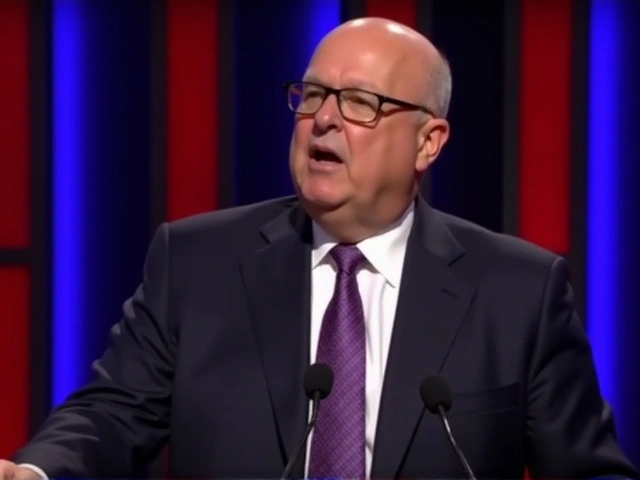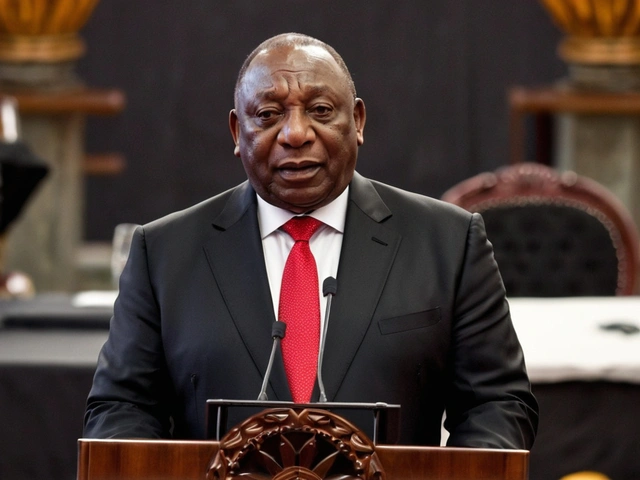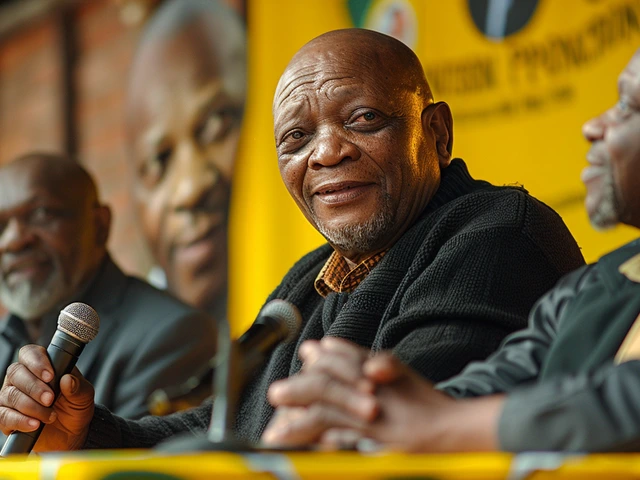
South Africa's 2024 Elections: A Turning Point for Democracy
In a pivotal moment for South African politics, President Cyril Ramaphosa has announced that the 2024 national and provincial elections underscore the strength of the country's democratic system. According to Ramaphosa, the elections, which saw a historic shift in power dynamics, have proved that democracy remains robust and resilient in South Africa.
The election results have brought significant changes to the political landscape. For the first time in 30 years, the African National Congress (ANC) lost its longstanding majority, securing only 159 seats in the 400-seat parliament. This seismic shift denotes a substantial departure from the status quo, where the ANC's dominance was a given in South African politics.
The Rise of the MK Party
A notable newcomer, the MK Party, has emerged as a significant force, earning 58 seats in the National Assembly. The rise of the MK Party indicates changing voter sentiments and a desire for fresh perspectives and leadership. This change brings a new dynamic to the political arena, challenging the established parties and fostering a competitive political environment.
The Democratic Alliance (DA), one of the prominent opposition parties, also made gains, increasing its parliamentary seats from 84 to 87. The DA's modest yet significant increase reinforces their presence as a key player in South African politics.
EFF's Decline
In contrast, the Economic Freedom Fighters (EFF) experienced a decline, losing five of their seats and dropping from 44 to 39. This decrease marks a setback for the EFF, which has been known for its vocal and radical approach. The loss of seats raises questions about the party's future strategies and its ability to resonate with the electorate moving forward.
The Independent Electoral Commission (IEC) declared that the elections were conducted freely and fairly, further underscoring the integrity of South Africa's democratic processes. IEC Chairperson Mosotho Moepya confirmed that out of the total votes cast, there were over 212,518 spoilt votes, highlighting the significance of both voter participation and awareness.
Coalition Talks and Future Governance
With the shift in parliamentary seats, discussions of coalitions have become inevitable. The DA has already announced the formation of a negotiation team to engage in coalition talks. This move signifies the complexities of forming a government in a more fragmented political landscape. Parties will need to find common ground and negotiate alliances to ensure stable governance.
As the dust settles, the first sitting of the National Assembly post-elections is scheduled to take place within 14 days. During this session, new decisions and policies will begin to take shape, reflecting the changes brought about by the election results.
Security and Stability Post-Elections
In the wake of the elections, Defence Minister Thandi Modise emphasized the government's commitment to safeguarding citizens' rights. Modise assured that the army remains vigilant and will not tolerate any attempts to disrupt the democratic process. Similarly, Police Minister Bheki Cele stated that police forces are prepared to maintain peace and stability, ensuring a secure environment for all citizens.
As the ANC grapples with the loss of its majority, party secretary-general Fikile Mbalula acknowledged the continued influence of former president Jacob Zuma. Mbalula mentioned that the ANC is open to dialogue with all political entities regarding potential coalitions. This openness indicates a willingness to adapt and navigate the new political terrain collaboratively.
DA's Stance on the MK Party
The DA has taken a firm position regarding the MK Party, especially in the KwaZulu-Natal region. The DA vowed to prevent the MK Party from gaining a foothold in this strategically important area. This stance highlights the ongoing political maneuvering and strategic planning that will characterize the post-election period.
In conclusion, the 2024 election results have marked a significant turning point in South African politics, reflecting a vibrant and evolving democracy. As the country moves forward, the newly shaped parliament will face the challenge of addressing the needs and expectations of its diverse electorate. The next steps taken by political parties in forming coalitions and governing effectively will be closely watched, as they will shape South Africa's future trajectory.








The shifting sands of South Africa's political landscape invite us to contemplate the essence of democratic resilience. When a party that has governed for three decades cedes its hegemony, it is not merely a statistical footnote but a testament to collective agency. The emergence of the MK Party suggests an electorate yearning for narratives that diverge from the established orthodoxy. One might argue that such pluralism emboldens the very fabric of participatory governance, weaving new threads into the democratic tapestry. In this moment, the nation stands at a crossroads where history, hope, and responsibility intersect, urging citizens to envision the contours of tomorrow.
Indeed, the electoral outcome reflects a sophisticated civic consciousness that merits commendation. The procedural integrity affirmed by the IEC underscores the robustness of institutional frameworks. It is heartening to observe that, despite the turbulence inherent in such transitions, the mechanisms of accountability remain intact. The measured discourse surrounding coalition possibilities exemplifies a mature political culture. One trusts that the ensuing negotiations will be guided by principles of inclusivity and respect for the diverse aspirations of the electorate.
The data points to a clear reshaping of parliamentary dynamics, and that is worth noting. With the ANC dropping below a majority, coalition-building becomes inevitable. The DA's incremental gains, while modest, position it as a pivotal player. Likewise, the MK Party's 58 seats could be a kingmaker in certain provincial alignments. Observers will be watching how policy priorities evolve under this new configuration.
From a structuralist perspective, the 2024 South African electoral outcomes constitute a paradigmatic inflection point, precipitating a reconfiguration of power matrices that warrants meticulous examination. The quantitative erosion of the ANC's seat count-from a hegemonic 400‑plus to a precarious 159-heralds a systemic attenuation of entrenched patron‑client networks, thereby destabilizing long‑standing neo‑institutional equilibria. Concurrently, the ascendant trajectory of the MK Party, encapsulated by its acquisition of 58 parliamentary mandates, introduces a novel vector of ideological heterodoxy, proliferating discursive pluralism within legislative deliberations. This emergent polity, characterized by fragmentation, engenders a multiplicity of coalition permutations, each contingent upon intricate bargaining dynamics predicated upon policy convergence, resource allocation, and intra‑party cohesion. The Democratic Alliance's marginal seat increment, registering three additional allocations, ostensibly augments its leverage in potential power‑sharing accords, yet its strategic posture vis‑à‑vis the MK contingent reflects a tactical calculus aimed at curtailing the latter's regional inroads, particularly within KwaZulu‑Natal. Moreover, the Economic Freedom Fighters' attrition of five seats underscores a potential de‑radicalization of propositional frameworks, compelling the EFF to recalibrate its rhetorical arsenal and constituency outreach methodologies. The IEC's affirmation of electoral veracity-underscored by the quantifiable metric of over 212,000 spoilt ballots-serves as a statistical artifact indicative of both voter disengagement phenomena and the complex psychodynamics of electoral protest. In summation, the resultant parliamentary mosaic-comprising 400 seats distributed across an array of emergent and legacy actors-necessitates a sophisticated, multidimensional analytical lens to explicate the ensuing governance architecture, coalition stability, and policy trajectory, all of which will indubitably shape South Africa's democratic trajectory for the ensuing decade.
Big shift in seats now the ANC gone from leader to minority making coalition talks a real game plan
It's encouraging to see voters demand fresh perspectives; the rise of new parties can inject much‑needed vitality into the legislative process. While the ANC grapples with its loss, the challenge will be ensuring that the coalition negotiations remain transparent and rooted in the public good. I hope all parties keep the citizens' welfare at the forefront as they navigate this unprecedented juncture.
Indeed, a transparent approach will bolster public trust and foster collaborative policymaking.
The electoral recalibration invites a reassessment of normative governance frameworks, urging stakeholders to transcend partisan myopia. As the DA prepares its negotiation team, the strategic acumen displayed will undoubtedly influence the balance of power, particularly in light of the MK Party's burgeoning constituency. It is imperative that discourse remains anchored in evidence‑based deliberation rather than succumbing to populist rhetoric.
One might observe, with a hint of sardonic admiration, that the very mechanisms designed to safeguard democracy are now being tested by the very actors they were meant to constrain. The heightened formality of discourse does little to mask the underlying jockeying for position; nevertheless, such theatricality is, perhaps, an inevitable by‑product of a maturing pluralistic system.
Everything's a setup, man-ever think the voting machines are just another layer of control? I mean, who benefits when a new party pops up? It's like the system's already rigged, just with fresher faces.
Let's stay focused on the facts and keep the conversation constructive.
Power shifts are inevitable; what matters is how we harness them for the collective good.
Wow! What an exciting time for South Africa! 🎉🚀
Ah, the glorious spectacle of democracy in action-so much drama, yet absolutely predictable. One can't help but smile at the choreography of power plays.
The rhetoric is inflamed, but the grammar is impeccable; let's keep the debate sharp and factual.
Looks like a colorful new chapter is being written, and the ink is still fresh.